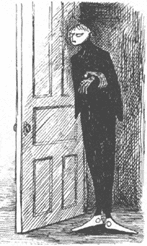Some of you know this already, but bear with me.
I went to college straight out of high school. I attended Occidental College, as had three other members in two different generations of my family (seriously; my mom, one of her cousins, and her dad all went there). I loved it there. LOVED. IT. I worked hard in all my classes, though some were easier than others, partly because I had a scholarship that required a 3.5 GPA but mostly because that’s how I’m wired. I take hard classes and work hard in them.
I knew I wanted to go to grad school, and eventually settled on either Journalism or Creative Writing as my subjects. I applied several places, and got into Stanford‘s Journalism program (aka Communications, Emphasis On Print Journalism), so I went there.
It was a one year Masters program, and it nearly killed me. Oh, man. I was so miserable. I wound up on academic probation because the work was so hard. I spent the entire winter sick with a series of colds due to stress. But I graduated! I completed my year and got my damn MA and put it to good use — I freelanced for a local paper and took other jobs to pay the rent and my loans. I used the knowledge from my classes to write darn good movie reviews, and I used the experience of getting my degree to survive having six jobs and working 15 hour days.
My stressful experience in grad school somewhat dimmed my love affair with academia, but not entirely. I think if I’d picked a different school I might have been happier. Stanford was not the right environment for me.
Anyway. I love books, I love learning, and if I could spend the rest of my life in college, I probably would.
Fast forward to now. I won a copy of Chris Guillebeau‘s book The Art of Non-Conformity from a contest at the Freak Revolution, and have been reading it. Part I was awesome! Lots of useful stuff about quitting stifling day jobs and striking out on your own. I was a little put off by his early statement that
…about halfway through checking off a list of required courses for graduate school, I realized that roughly 80 percent of the assignments I worked on had little or no value. The projects were simply “busywork” designed to keep students working on something so that the system could sustain itself.
One of his professors even agreed with this assessment.
I shrugged, figured he went to a shit graduate school, and kept reading. And all was well, until I hit Chapter 6: Graduate School vs The Blogosphere. It starts with a summary of Guillebeau’s academic career: he dropped out of high school, went to community college for a couple years, then transferred to a small state school where he earned a BA in two years while also doing a BA at the community college, cos everything was so easy. He describes that he didn’t actually learn much from the experience beyond
…how to bluff my way through exams, how to quickly memorize (and quickly forget), and how to make myself look good. These are important skills in college and life, no doubt, but they can also be a hindrance to creating anything of lasting value.
I was sort of boggled, but kept reading. After a few years working as an aid volunteer in West Africa (how awesome is that?) he applied to grad school, talking his way around the entrance exam because “I knew if I actually took the test, I would score poorly on it compared to students with a more traditional education.” He got in, finished way early, and decided to keep his MA and skip a PhD.
He then launches into an analysis of going to grad school vs alternative methods of getting the same stuff which just… man. This section made me so mad.
He lays out a program for replicating grad school on your own dime, which is pretty awesome if you’re doing the same major he did, International Studies. It gives you knowledge about other cultures and religions in spades. It’d be useless for anybody doing anything else, though. Want to teach English, become a journalist, or do anything in the sciences, and boy howdy, his method would help your career about zilch. Help you be a more rounded person, sure. But substitute for grad school? Not so much.
Then there’s his comparison of grad school vs. jumping into the blogosphere and writing. This made my blood boil and inspired my tweet from last night: “Reading @chrisguillebeau‘s book. Loved the first part, but he is losing me with all his academia-bashing in part 2. Bummer.”
The part that really got me was this:
Outcomes
Grad school: Nice piece of paper
Blogosphere: Highly active readership, speaking offers, side business, book contract.
I nearly threw the book against the wall. Nice piece of paper. Wow. How fucking dismissive can you get? And sure, his experience in the blogosphere got him all that. Plenty of people blog seriously and don’t get anything like a book contract out of it.
The next line in his table is:
Feedback from readers
Grad school: “Good job” from three people
Blogosphere: Thousands of positive comments from all over the world.
I probably don’t even have to explain why this pissed me off.
I can only assume he went to a really, really shit grad school. My grad school experience gave me a vastly improved earning potential, confidence in my ability to survive anything, and a ton of experience in my field. Also, job references and career advice. Hell, grad school is where I learned I really, really didn’t want to be a regular journalist, which probably did more to help me have a happy life than anything prior to that in my academic career. My internship at the San Mateo County Times was a revelation.
Now, I am well aware that I probably have a serious case of commitive dissonance* (ETA: whup, it’s cognitive dissonance, specifically the Effort-Justification Paradigm) going on because grad school was so difficult for me. But the entire chapter came across as “college and grad school are super easy, expensive, and ultimately not as useful as doing your own thing.” Which is probably true for people like Chris. But for someone like me, it’s not only false but insulting.
Now, here’s where my loving Twitter comes in. I woke up this morning to find the following tweet: “ChrisGuillebeau: @Ealasaid i’m not academia-bashing – i said that i have no regrets about my grad school experience (but it’s definitely not for everyone)”
Hot damn! He replied! However, a couple mentions in the book that he doesn’t regret going doesn’t make up for the rest of the chapter described above. I tried unsuccessfully to sum this up in 140 characters (minus 16 chars for “@chrisguillebeau”) and failed, so I tweeted back, “@chrisguillebeau My explanation of why it feels like bashing to me is probably beyond the scope of a tweet. I shall blog about it.”
Which brings me here.
I love it when the people I tweet about actually notice and tweet me back. It makes them more human. Granted, his reply didn’t change my mind, but it did prompt me to write this post rather than just giving up on the book. As an aside, though: telling a reader that their emotional response to your writing is incorrect is not conducive to having a happy reader/return customer.
His next reply did make me a little less aggro at him, though: “@Ealasaid no worries and i wish you well — hopefully Part III lives up to Part I :)”
So yay Twitter. I’m going to keep reading, but I have to say that when I recommend the book to my friends (which, unless part III totally lets me down, I will) I’m probably going to tell them to ignore chapter 6.
*I think that’s the right term. You know, that thing where the more you suffer, the more strongly you are committed to the thing causing the suffering? It’s how hazing works, and why people tend to stick with the same dentist. I heard a nifty NPR story about it recently.




6 Responses to Academia, Analysis, and Why I Love Twitter